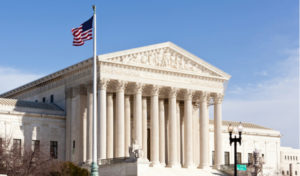
When Governor Scott Walker signed Right to Work legislation in Wisconsin, it began a drop in union membership that has so far taken 60% of government employees off the rolls. It turns out that when employees aren’t forced to join unions to keep their jobs, they typically don’t want to.
The case before the court today, Janus v. American Federation of State, County and Municipal Employees will determine whether or not public unions can force non-members who work for the government to pay what are known as “agency fees.” The argument is that these fees are by their very nature political funding, since they are used to sway public policy. If the Supreme Court agrees, a massive funding source will be stripped from unions, and their political effectiveness will plummet.
Daniel DiSalvo and Stephen Eide write:
The question in Janus is whether it is constitutional that government employees who have decided not to join a union are still required to pay “agency fees.” Under federal law, workers cannot be forced to join a union. But laws in 22 states say that nonmembers must nonetheless pay unions a fee to cover the cost of collective bargaining and contract administration. The difference usually isn’t much. The agency fee at issue in Janus totals 78% of full union dues.
The unions justify agency fees with the dubious premise that what they do at the bargaining table is somehow apolitical, even though their negotiations cover everything from the structure of retirement benefits to teacher tenure. “The problem is that everything that is collectively bargained with the government is within the political sphere, almost by definition,” Justice Antonin Scalia remarked during oral arguments in a 2016 case. This line of reasoning leads to the conclusion that imposed agency fees violate the First Amendment—that employees who oppose the union’s goals cannot be compelled to support speech with which they disagree.
In that 2016 case, Friedrichs v. California Teacher Association, the justices seemed set to strike down agency fees. But Scalia died and the court split 4-4. Now, with Justice Neil Gorsuch on the bench, the court seems likely to deem agency fees unconstitutional. The ruling in Janus will probably come in June.
Read more here.



